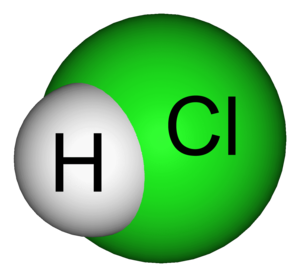Hypochlorhydria
| Achlorhydria | |
|---|---|
 |
|
| Hydrogen chloride (major component of gastric acid) | |
| Classification and external resources | |
| Specialty | gastroenterology |
| ICD-10 | K31.8 |
| ICD-9-CM | 536.0 |
| DiseasesDB | 29513 |
| eMedicine | med/18 |
| MeSH | D000126 |
Achlorhydria /eɪklɔərˈhaɪdriə/ or hypochlorhydria refers to states where the production of hydrochloric acid in gastric secretions of the stomach and other digestive organs is absent or low, respectively. It is associated with various other medical problems.
Irrespective of the cause, achlorhydria can result as known complications of bacterial overgrowth and intestinal metaplasia and symptoms are often consistent with those diseases:
Since acidic pH facilitates the absorption of iron, achlorhydric patients often develop iron deficiency anemia. Acidic environment of stomach helps conversion of pepsinogen into pepsin which is most important to digest the protein into smaller component like complex protein into simple peptides and amino acids inside stomach which is later absorbs by gastro intestinal tract.
Bacterial overgrowth and B12 deficiency (pernicious anemia) can cause micronutrient deficiencies that result in various clinical neurological manifestations, including visual changes, paresthesias, ataxia, limb weakness, gait disturbance, memory defects, hallucinations and personality and mood changes.
Risk of particular infections, such as Vibrio vulnificus (commonly from seafood) is increased. Even without bacterial overgrowth, low stomach acid (high pH) can lead to nutritional deficiencies through decreased absorption of basic electrolytes (magnesium, zinc, etc.) and vitamins (including vitamin C, vitamin K, and the B complex of vitamins). Such deficiencies may be involved in the development of a wide range of pathologies, from fairly benign neuromuscular issues to life-threatening diseases.
...
Wikipedia
